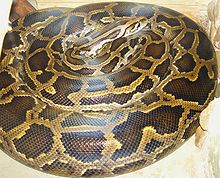Burmese python
| Burmese Python | |
|---|---|
 |
|
| Scientific classification | |
| Kingdom: | Animalia |
| Phylum: | Chordata |
| Subphylum: | Vertebrata |
| Class: | Reptilia |
| Order: | Squamata |
| Suborder: | Serpentes |
| Family: | Pythonidae |
| Genus: | Python |
| Species: | P. bivittatus |
| Binomial name | |
|
Python bivittatus Kuhl, 1820 |
|
| Synonyms | |
|
Python molurus bivittatus Kuhl, 1820 |
|
Python molurus bivittatus Kuhl, 1820
The Burmese python (Python bivittatus) is one of the five largest species of snakes in the world (about the third-largest as measured either by length or weight). It is native to a large variation of tropic and subtropic areas of South and Southeast Asia. Until 2009, it was considered a subspecies of Python molurus, but now is recognized as belonging to a distinct species.
They are often found near water and are sometimes semi-aquatic, but can also be found in trees. Wild individuals average 3.7 m (12.1 ft) long, but have been known to reach 5.74 m (18.8 ft).
Burmese pythons are dark-colored snakes with many brown blotches bordered in black down the back. The perceived attractiveness of their skin pattern contributes to their popularity with both reptile keepers and the leather industry. The pattern is similar in colour, but different in actual pattern from the African rock python (Python sebae), sometimes resulting in confusion of the two species outside of their natural habitats. The African rock python can generally be distinguished by its tighter pattern of markings, compared to the Burmese python, which has bolder patterns, similar to those seen on a giraffe.
In the wild, Burmese pythons grow to 3.7 m (12 ft 2 in) on average, while specimens of more than 4 m (13 ft 1 in) are uncommon. This species is sexually dimorphic in size; females average only slightly longer, but are considerably heavier and bulkier than the males. For examples, length-weight comparisons in captive Burmese pythons for individual females have shown: at 3.47 m (11 ft 5 in) length, a specimen weighed 29 kg (64 lb), a specimen of just over 4 m (13 ft 1 in) weighed 36 kg (79 lb), a specimen of 4.5 m (14 ft 9 in) weighed 40 kg (88 lb), and a specimen of 5 m (16 ft 5 in) weighed 75 kg (165 lb). In comparison, length-weight comparisons for males found: a specimen of 2.8 m (9 ft 2 in) weighed 12 kg (26 lb), 2.97 m (9 ft 9 in) weighed 14.5 kg (32 lb), a specimen of 3 m (9 ft 10 in) weighed 7 kg (15 lb), and a specimen of 3.05 m (10 ft 0 in) weighed 18.5 kg (41 lb). In general, individuals over 5 m (16 ft 5 in) are rare. The record maximum length for Burmese pythons is held by a female named “Baby”, that lived at Serpent Safari, Gurnee, Illinois, for 27 years. Shortly after death, her actual length was determined to be 5.74 m (18 ft 10 in). Widely published data of specimens that were reported to have been even several feet longer are not verified. Dwarf forms occur on Java, Bali, and Sulawesi. On Bali, they reach an average length of 2 m (6 ft 7 in), and on Sulawesi, they achieve a maximum of 2.5 m (8.2 ft).
...
Wikipedia

